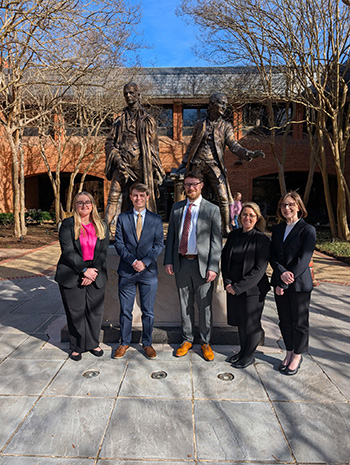
Moot Court at Widener Law Commonwealth: A Challenge and Opportunity for Aspiring Lawyers
Moot court at Widener University Commonwealth Law School provides students with a unique chance to hone essential skills in legal research, writing, oral advocacy, and critical thinking. As part of the Appellate Advocacy Honor Society, also known as AAHS, students simulate Supreme Court and appellate arguments, preparing them for real-world litigation.
Assistant Professor of Law Noah Chauvin, who serves as a coach for one of the moot court teams, explains, “Moot court is a competition team where students argue appellate cases before panels of judges, mirroring real-world appellate practice. They receive a legal problem that outlines issues they need to address, write a 30-to-50-page brief requiring extensive research, and then present oral arguments while being questioned by judges.”
Competitions take place across the country, with teams advancing based on their performance in both written and oral advocacy. Judges for these competitions range from practicing attorneys to professors and sitting judges, providing students with invaluable feedback from experienced legal professionals.
Jonathan Koltash, who has been coaching the moot court teams for over a decade and assumed the role of Appellate Advocacy Honor Society supervisor in 2021, emphasized the unique value of the program. “This is an outstanding opportunity to do something almost identical to what practicing attorneys do,” Koltash said. “What you learn through the AAHS translates directly to appellate law. You get to make real-life arguments before experienced attorneys in courtrooms across the nation.”
Isaac Evans, a second-year extended-division student, joined moot court for its focus on appellate work and the opportunity to engage in research and oral arguments. “Moot court challenges you to think beyond your comfort zone, especially when preparing and presenting arguments,” he shared. Evans emphasized the development of his research, writing, and analytical reasoning skills, noting the intense preparation that includes weeks of research, writing briefs, and practicing arguments with guest judges. Despite the pressure of tight deadlines, Evans overcame challenges like writer’s block and found his confidence growing. “My advice to students is to listen closely to your legal methods professors, take notes, and really focus on research and writing,” he said.
Cassidy Hartle, also a second-year student, joined Moot Court to push herself outside her comfort zone. “It makes me a better writer, speaker, and student,” Hartle said. She faced the challenge of arguing both sides of legal issues but found support from her teammates and coach, which helped her improve. One proud moment came when she handled a tough hypothetical question during practice, demonstrating her ability to think on her feet.
Paige Oustrich, another second-year student, joined moot court after enjoying the oral arguments in her legal methods II course. She noted how the experience gave her a chance to showcase her legal knowledge beyond exams. “We practice two to three times a week, often in front of professors and guest judges ranging from attorneys to law clerks,” Oustrich explained. Despite the difficulty of writing a brief under tight deadlines, she valued the teamwork and the opportunity to refine her skills.
Margot Crouch, a second-year extended-division student, joined moot court to further develop her legal writing and oral advocacy skills. “Moot court has been a crash course in legal topics and writing skills,” she said. Like her teammates, Crouch faced the challenge of working independently on research and writing, especially when researching distinct areas of constitutional law. “The experience pushed me to work through isolation and tight deadlines, and the skills I’ve developed are invaluable for my future legal career,” she shared.
Chauvin highlighted the significance of the program: “Moot court requires significant time and effort, but the skills students gain—whether in public speaking, legal writing, or confidence under pressure—are invaluable.”
Koltash added that the Appellate Advocacy Honor Society offers unique exposure. “Students don’t just learn legal theory; they practice in real settings. They’re presenting cases in courtrooms across the country, learning firsthand what appellate advocacy is like. That experience is incredibly valuable,” he said.
